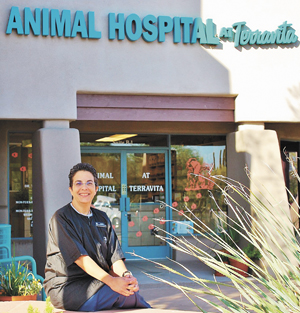
MAY 25, 2011
Groomer a hit at Animal Hospital at Terravita
 SCOTTSDALE – She looks up and smiles as she peers from behind the legs of the Standard Poodle she is grooming. Cuban born, Caridad Valladares or Betsy, as she is known to us says, “I love these dogs, they are one of my favorite breeds to groom.” It shows, as she meticulously hand scissors away at the fluffy pup!
SCOTTSDALE – She looks up and smiles as she peers from behind the legs of the Standard Poodle she is grooming. Cuban born, Caridad Valladares or Betsy, as she is known to us says, “I love these dogs, they are one of my favorite breeds to groom.” It shows, as she meticulously hand scissors away at the fluffy pup!
Betsy came to Animal Hospital At Terravita just a month ago and has already made great friends with many a pup who walks through the doors. Not only her talent, but her gentle nature, makes her a hit with Schnauzers, Yorkies, Goldens and German Shepherds, to name a few. Let’s not forget to mention the clients too!
Betsy is a true animal person who talks the talk and walks the walk. She holds her certificate in Professional Grooming and Pet CPR as well. When asked if she has ever had to use her CPR skills, she responds with a very happy face, “Yes, and everyone survived!” Her meditation practice and peaceful approach to life are invaluable to her grooming as she works with the ‘Patience of a Saint.’
Grooming by Betsy, at Animal Hospital At Terravita is available by appointment.
Call 480-575-8347 to schedule your pet’s next grooming.
Courtesy Photo
MAY 25, 2011
Sun exposure and summer skin care for your pets
 As the weather warms up, many people take to bathing their pets outside. It seems like a good idea, as pets may dry faster and cause less water mess. However, according to Dr. Alison Diesel, lecturer in small animal dermatology, at the Texas A&M College of Veterinary Medicine and Biomedical Sciences, it is important to remember that water coming initially out of the hose may be very hot.
As the weather warms up, many people take to bathing their pets outside. It seems like a good idea, as pets may dry faster and cause less water mess. However, according to Dr. Alison Diesel, lecturer in small animal dermatology, at the Texas A&M College of Veterinary Medicine and Biomedical Sciences, it is important to remember that water coming initially out of the hose may be very hot.
“One of the problems we see related to hot weather is thermal burns from hoses that have been sitting outside in the sun all day,” says Diesel. “Make sure to let the water run through the hose for several minutes before bathing your dog.”
Staying out in the sun too long without any type of protection can cause sunburns in animals, especially those that are lightly pigmented or have thinner coats. White animals, animals that like to spend time sunbathing, and even certain parts on every animal, such as the nose (especially pink noses), ears, or abdomen, are especially prone to sunburn.
“One of the things people can do is to apply sunscreen on lightly pigmented or thinly furred areas before the animal goes outside or lays in a sunbeam to bathe,” states Diesel. “As with people, the sunscreen will need to be applied once every couple of hours. Sunscreens that have high SPFs (50+) and that are safe for infants are safe for a dog or a cat.”
“Another thing an owner can do,” notes Diesel, “is prevent sunbathing during the peak times of the day, or when the sun is at its strongest. This is typically from the early afternoon until evening. Cats that sit in windowsills particularly need to be monitored.”
As with people, animals that become sunburned have the possibility of cancer developing from sun exposure. If you notice a change in the appearance of your pet’s skin – increased redness, raised skin legions, bumps or wounds – have your pet evaluated by its veterinarian.
“Actinic keratosis, a condition that causes raised, red, flat-topped areas of skin that may have a dry appearance, is associated with increased sun exposure and may progress into cancer in the future if not addressed,” warns Diesel.
An additional problem exacerbated by sun exposure is discoid lupus, an immune-mediated skin disease of the nose. Some dog breeds that are particularly affected by this are Huskies, Malamutes, and other northern breeds and shepherds.
Explains Diesel, “The normally dark colored nose loses its pigment and turns pink. It can also become crusted and ulcerate; this may be noted as bleeding by the owners. The decreased pigment puts the nose more at risk for sunburn. It is important that dogs diagnosed with this condition have infant-safe sunscreen applied several times daily to avoid intensifying the disease.”
While lighter-pigmented animals are more prone to developing burns, darker colored animals are not without their own concerns.
“According to studies in cattle that observed the effects of hide color and the risk of heat stress, darker pigmented animals were more at risk for heat stress,” explains Dr. Diesel.
“This does not usually cause skin problems; however, darker animals are more at risk for developing the side effects of heat stress, which include over-heating and heat stroke. These are emergency situations requiring immediate evaluation by a veterinarian.”
In spite of the many risks, it is possible for you and your pets to enjoy the summer out of doors, provided the proper precautions are taken. Train yourself to reapply your pet’s sunscreen each time you reapply yours, and make sure your outdoor pets have access to fresh water and shady places to find some respite from the sun’s rays. Check the temperature of the water before bathing your pet out of doors. And remember to enjoy your vacations with your best friend!



